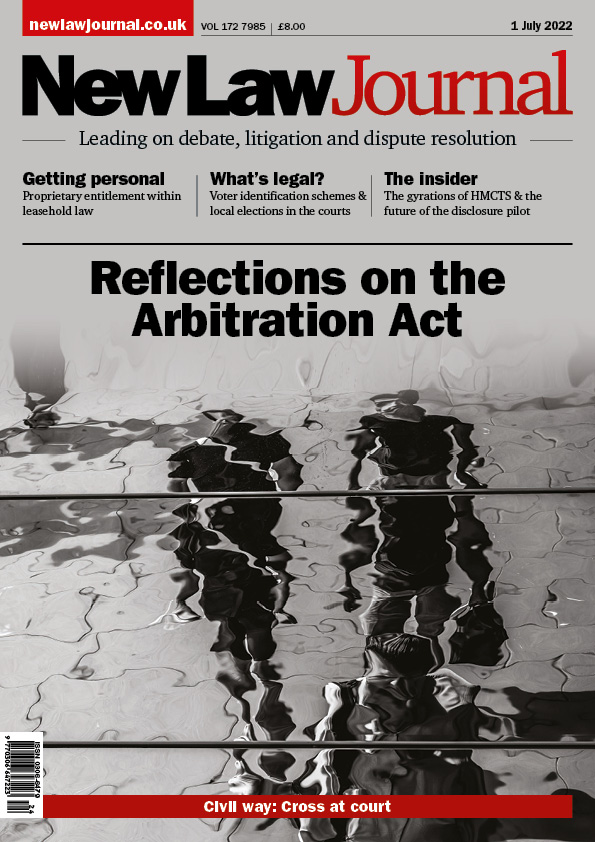THIS ISSUE

Challenging an arbitration award on jurisdiction: the ‘rehearing’ nature of a section 67 challenge by Ravi Aswani & Valya Georgieva
Ping-fat Sze questions whether parties involved in small claims proceedings are fairly treated
Leasehold law: a blessing or a burden? Alec Samuels discusses the much-anticipated Leasehold Reform (Ground Rent) Act 2022
Dominic Regan rummages through the latest news on the small claims regime, the disclosure pilot & a landmark decision coming your way…
Cultural change is key in the war for talent, says Dana Denis-Smith
Nicholas Dobson examines the courts’ treatment of recent pilot schemes requiring voter identification in local elections
Adam Greaves & Emma Sutton explain the many benefits of boutique firms
Mark Pawlowski looks at the non-proprietary nature of a tenancy
Cross at court; 9.25% interesting; One-way judgment attack; 18 plus and sch 1; Who pays for the ATE?; Divorce update
MOVERS & SHAKERS

Jurit LLP—Caroline Williams
Private wealth and tax team welcomes cross-border specialist as consultant
.tmb-mov69x69.jpg?sfvrsn=961ae4db_1)
HFW—Simon Petch
Global shipping practice expands with experienced ship finance partner hire
95ca96e3d47f4eff8d147c4f0df17c77.tmb-mov69x69.png?sfvrsn=3db5d86b_1)
Freeths—Richard Lockhart
Infrastructure specialist joins as partner in Glasgow office
NEWS
Talk of a reserved ‘Welsh seat’ on the Supreme Court is misplaced. In NLJ this week, Professor Graham Zellick KC explains that the Constitutional Reform Act treats ‘England and Wales’ as one jurisdiction, with no statutory Welsh slot
The government’s plan to curb jury trials has sparked ‘jury furore’. Writing in NLJ this week, David Locke, partner at Hill Dickinson, says the rationale is ‘grossly inadequate’
A year after the $1.5bn Bybit heist, crypto fraud is booming—but so is recovery. Writing in NLJ this week, Neil Holloway, founder and CEO of M2 Recovery, warns that scams hit at least $14bn in 2025, fuelled by ‘pig butchering’ cons and AI deepfakes
After Woodcock confirmed no general duty to warn, debate turns to the criminal law. Writing in NLJ this week, Charles Davey of The Barrister Group urges revival of misprision or a modern equivalent
Family courts are tightening control of expert evidence. Writing in NLJ this week, Dr Chris Pamplin says there is ‘no automatic right’ to call experts; attendance must be ‘necessary in the interests of justice’ under FPR Pt 25






